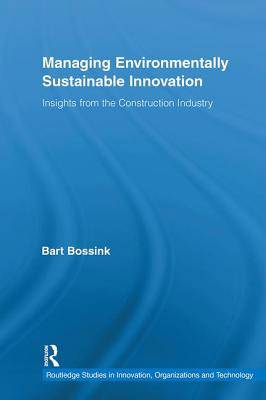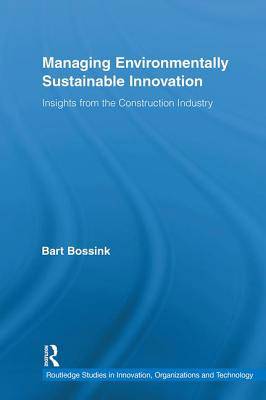
- Retrait gratuit dans votre magasin Club
- 7.000.000 titres dans notre catalogue
- Payer en toute sécurité
- Toujours un magasin près de chez vous
- Retrait gratuit dans votre magasin Club
- 7.000.000 titres dans notre catalogue
- Payer en toute sécurité
- Toujours un magasin près de chez vous
Managing Environmentally Sustainable Innovation
Insights from the Construction Industry
Bart BossinkDescription
A paradigm shift is happening at this moment. Firms and consumers are aware of the fact that they cause environmental pollution, depletion of resources and are responsible for the dangers involved. At the same time awareness is growing that they need to and will develop the appropriate solutions in the time to come. The idea that sustainable, cyclic businesses are more logical than consumption-oriented and waste-dumping ones seems fascinating to a growing number of people. For this change to happen new thinking and behavior is needed.
Firms and consumers play a central role in a sustainable business. Companies deliver what consumers buy and vice versa. In a sustainable paradigm, companies are able to develop and produce sustainably. Therefore, companies need new management concepts for sustainable investment, manufacturing, logistics and marketing and for sustainable management.
In Managing Environmentally Sustainable Innovation, Bossink evaluates the innovation chain in a process of five consecutive stages, articulates five levels at which people collectively manage the chain, and analyzes the interplay between the two. Acquainting the reader with the complexities of innovation, as well as which complexities are active in the management of environmental sustainability, this book offers guiding principles and a toolbox for the management of environmentally sustainable innovation in construction.
Spécifications
Parties prenantes
- Auteur(s) :
- Editeur:
Contenu
- Nombre de pages :
- 206
- Langue:
- Anglais
- Collection :
Caractéristiques
- EAN:
- 9780415879712
- Date de parution :
- 06-04-11
- Format:
- Livre relié
- Format numérique:
- Ongenaaid / garenloos gebonden
- Dimensions :
- 155 mm x 229 mm
- Poids :
- 408 g







